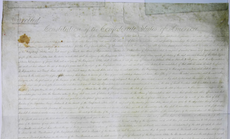Thomas R. R. Cobb
Thomas R. R. Cobb | |
|---|---|
| In office February 8, 1861 – February 17, 1862 | |
| Preceded by | New creation |
| Succeeded by | Position abolished |
| Personal details | |
| Born | Thomas Reade Rootes Cobb April 10, 1823 Jefferson County, Georgia |
| Died | December 13, 1862 (aged 39) Fredericksburg, Virginia |
| Nationality | American |
| Spouse | Marion Lumpkin |
| Relations |
|
| Children | 3 (surviving) |
| Alma mater | Franklin College |
| Military service | |
| Allegiance | |
| Branch/service | |
| Years of service | 1861–1862 |
| Rank | |
| Commands | Cobb's Legion Cobb's Brigade |
| Battles/wars | American Civil War |
Thomas Reade Rootes Cobb (April 10, 1823 – December 13, 1862), also known as T. R. R. Cobb, was an American lawyer, author, politician, and Confederate States Army officer, killed in the Battle of Fredericksburg during the American Civil War. He was the brother of noted Confederate statesman Howell Cobb.
Early life, education and marriage
Cobb was born in 1823 in Jefferson County, Georgia, to John A. Cobb and Sarah (Rootes) Cobb. He was the younger brother of Howell Cobb. Cobb graduated in 1841 from Franklin College[1] (present-day University of Georgia), where he was a member of the Phi Kappa Literary Society. He was admitted to the bar in 1842.
He married Marion Lumpkin, daughter of the
Political career
From 1849 to 1857, he was a reporter of the Supreme Court of Georgia. He was an ardent secessionist, and was a delegate to the Secession Convention. He is best known for his treatise on the law of slavery titled An Inquiry into the Law of Negro Slavery in the United States of America (1858), a passage of which reads:
[T]his inquiry into the physical, mental, and moral development of the negro race seems to point them clearly, as peculiarly fitted for a laborious class. The physical frame is capable of great and long-continued exertion. Their mental capacity renders them incapable of successful self-development, and yet adapts them for the direction of the wiser race. Their moral character renders them happy, peaceful, contented and cheerful in a status that would break the spirit and destroy the energies of the Caucasian or the native American.[3]
Cobb's Inquiry represented the capstone of proslavery legal thought and has been called one of the most comprehensive American proslavery treatise.[4] It drew together examples from world history of slavery, which he used to argue that slavery was close to ubiquitous in human history and thus natural. He also drew on evidence of slavery's economic necessity and on then popular ideas of "science," which supported white supremacy and slavery.[5]
Cobb was also one of the founders of the
Cobb served in the
American Civil War
Cobb organized
Death and legacy

At the Battle of Fredericksburg, he was mortally wounded in the thigh by a Union artillery shell that burst inside the Stephens house near the Sunken Road on Marye's Heights. He bled to death from damage to his femoral artery on December 13, 1862.[10] Some later accounts by veterans claim that the wounding was by rifle fire and that a Confederate soldier may have been responsible.[11] He is buried at Oconee Hill Cemetery in Athens, Georgia.
The T. R. R. Cobb House, where Thomas Cobb and his wife Marion lived in Athens is now a museum. Originally constructed across Prince Avenue from its current location, it was moved to Stone Mountain Park in Stone Mountain, Georgia, where it was partially reassembled about 1990. Stone Mountain Park had hoped to restore the house, but the project fell through. Then, it was transported back to Athens where it was reassembled and underwent an extensive restoration. The house is now an operational museum owned by the Watson-Brown Foundation.
Works
- Digest of the Statute Laws of Georgia (1851)[1]
- Inquiry into the Law of Negro Slavery in the United States (1858)[2]
- Historical Sketch of Slavery, from the Earliest Periods (1859)[3]
- The Code of the State of Georgia (1861) AKA The Code of 1863 because though published in 1861, the Georgia General Assembly did not pass it till 1863.[4]
- The Code of the State of Georgia (1873)
- The Colonel (1897)
See also
- List of American Civil War generals (Acting Confederate)
- List of American Civil War generals (Confederate)
- List of signers of the Georgia Ordinance of Secession
Notes
- ^ ISBN 978-0-8047-3641-1, p. 592.
- ISBN 978-0-8203-3044-0.
- ISBN 978-0-8078-4817-3., p. 18.
- ^ Alfred L. Brophy, University, Court, and Slave: Pro-Slavery Thought in Southern Colleges and Courts and the Coming of Civil War (2016): 227-53.
- ^ Alfred L. Brophy, Antislavery Women and the Origins of American Jurisprudence, Texas Law Review 94 (2015): 115, 123-25.
- JSTOR 40580436.
- ^ Andrew P. Morriss, "Georgia Code (1861)," in Slavery in the United States: A Social, Political, And Historical Encyclopedia, vol. 2, ed. Junius P. Rodriguez (Santa Barbara: ABC-CLIO, 2007), 314-315.
- ISSN 0362-4331. Retrieved April 26, 2018.
- ^ In Ahmaud Arbery's Name, Georgia Repeals Citizen's Arrest Law, npr.org. Accessed March 4, 2024.
- ^ O'Reilly, p. 296; Eicher, p. 592.
- ^ Controversies about the death of T. R. R. Cobb Archived August 22, 2006, at the Wayback Machine
References
- Eicher, John H., and ISBN 978-0-8047-3641-1
- McCash, William B. 1983. Thomas R.R. Cobb: The Making of a Southern Nationalist. Macon, GA: Mercer University Press.
- O'Reilly, Francis Augustín, The Fredericksburg Campaign: Winter War on the Rappahannock, Louisiana State University Press, 2003; ISBN 0-8071-3154-7
- Sifakis, Stewart. Who Was Who in the Civil War. New York: Facts On File, 1988; ISBN 978-0-8160-1055-4
- ISBN 978-0-8071-0823-9
External links
- Marion Lumpkin Cobb profile, womenhistoryblog.com. Accessed March 4, 2024.
- Thomas Reade Rootes Cobb at the New Georgia Encyclopedia

